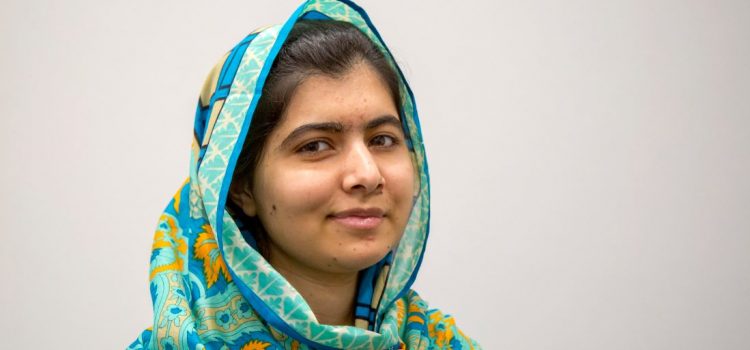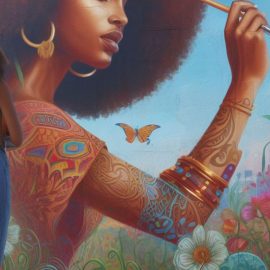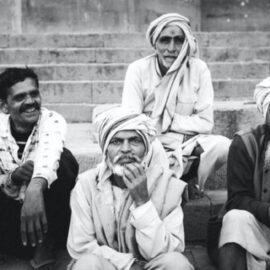

This article is an excerpt from the Shortform book guide to "I Am Malala" by Malala Yousafzai. Shortform has the world's best summaries and analyses of books you should be reading.
Like this article? Sign up for a free trial here.
What was Malala Yousafzai’s family like? What values did they pass on to her?
Malala Yousafzai was born into poverty in a society that valued boys over girls and religious tradition over secular education. Yet, she became a Nobel-winning activist for girls’ education. The values of her family—compassion, gender equality, education, hospitality, and compassion—shaped her life early on.
Read more to learn about the childhood of Malala Yousafzai.
Image source: Simon Davis/DFID
The Childhood of Malala Yousafzai
In our overview of the childhood of Malala Yousafzai, we’ll examine the early influences that made her who she is, focusing on how her family was willing to defy tradition and fundamentalist religious views to raise her in an environment of compassion, gender equality, and secular education.
Born Into Poverty
Malala was born in 1997 in the Swat Valley of Pakistan. Called the “Switzerland of the East,” it was a beautiful, mountainous region full of rivers and lakes. It attracted wealthy tourists from all over the world.
(Shortform note: Although Malala describes the Swat Valley of her childhood as a type of paradise, she points out later in the book that as the Taliban rose to power in the area, they destroyed many of Swat’s treasured landmarks. They blew up Buddhist statues that were thousands of years old. Climate change has also taken a toll on the area, increasing the frequency and severity of weather events like floods. Foreign tourism, once a mainstay of the economy in Swat, has declined significantly over the years.)
When Malala was young, her family was very poor. They lived in a two-room shack opposite the school her father, Ziauddin, had cofounded. They had no bathroom or kitchen. Malala’s mother, Toor Pekai, cooked over a fire on the ground. Later, they moved to a one-story concrete house.
(Shortform note: Poverty has long been a problem in Pakistan. In the late 1990s, when Malala was an infant, the poverty rate in Pakistan was around 60%. It declined to around 20% by 2019, but rose again to nearly 40% by 2023. While many factors contribute to poverty in Pakistan, the World Bank has emphasized the role played by powerful vested interests in the military, politics, and business, which control the country’s policy decisions. The Pakistani government has said that a low level of investment in education is also a major cause of poverty in the country.)
Malala’s Pashtun Family Valued Hospitality and Compassion
Malala belongs to the Pashtun tribe. Pashtuns live in both Pakistan and Afghanistan—they inhabited the region long before the British drew the dividing line between the two countries.
(Shortform note: Pakistan is a melting pot of ethnicities, cultures, and languages. It has six major ethnic groups: Punjabi, Pashtun, Sindhi, Saraiki, Muhajir, and Balochi. Approximately 40% of Pakistanis are Punjabi. Pashtuns are the second largest ethnic group in Pakistan, comprising about 18% of the population. Languages spoken in Pakistan include Urdu, English, Punjabi, Pashto, and many others.)
Pashtuns’ most important values are honor and hospitality. Malala’s family also valued generosity and compassion toward the less fortunate. For example, Ziauddin let poor children enroll in his school free of charge. When the school eventually grew to 800 students, 100 of them were attending tuition-free. Malala’s mother let some of these children live with the family, and she fed breakfast to other students because she said it was hard for them to learn when they were hungry.
Like her parents, Malala was motivated by compassion for the poor. There was a huge trash heap down the street from her house because there was no garbage collection in Swat. When she saw some children there, collecting recyclable waste to sell, Malala begged her father to give the children free places at his school. He explained that they were probably the breadwinners for their families, so if they went to school, their families would go hungry. Instead, he started a local campaign arguing for the education of these poor children.
Malala learned an early lesson about compassion versus revenge from her parents. She had a toy cell phone that disappeared one day, and Malala thought her friend had stolen it. In retaliation, Malala began stealing her friend’s toys. When Malala’s mother found out, Malala initially lied and said she hadn’t done it, but then she confessed. She cried and apologized to her mother, who then took Malala to apologize to her friend. Malala never lied or stole again.
Afterward, her father consoled her by telling her stories of great leaders who had made mistakes. Malala learned that everyone makes mistakes; what matters is what you learn from them. This influenced her belief that the Pashtun emphasis on revenge was wrong. Instead of hurting someone who hurt you, as was the Pashtun practice, Malala believed you should teach them to do better.
| Modeling Compassion and Generosity to Children By engaging in generous and honorable acts themselves, Malala’s parents were taking part in one of the most powerful methods of teaching children empathy for the less fortunate: modeling. Studies have shown that kids are more likely to share with others or give winnings away when they see other people modeling this behavior. Research also demonstrates that highly altruistic people generally had parents who were also altruistic. These parents practiced what they preached and had strong positive relationships with their kids, which encouraged the children to model their behavior after their parents’. Malala’s parents modeled generosity, hospitality, and integrity by educating, housing, and feeding poor children; starting a campaign to educate children who collected trash for a living; and accompanying Malala to apologize to her friend when Malala stole her toys. The latter act not only taught Malala to apologize when she’d done something wrong, but it also encouraged her to have compassion for her friend even though Malala believed her friend had stolen her toy cell phone. |
Gender Roles in Malala’s Family and Pashtun Society
Malala’s family were traditional Pashtun Muslims in many ways, but when it came to gender roles, they frequently defied tradition. Pashtun marriages are usually arranged, but Malala’s parents married for love. Malala says that many Pashtun men physically abuse their wives, but Ziauddin cherished Toor Pekai and would never do such a thing. Ziauddin also talked his problems over with Toor Pekai and listened to her advice, even though in Pashtun society it’s seen as weak for men to share problems with women.
(Shortform note: The vast majority of marriages in Pakistan—80% or more—are arranged. Typically, family members arrange a marriage as a way to create an alliance between two families. Families evaluate prospective matches based on factors such as tribal affiliation and caste rather than love or romance. However, marriages based on love have become more popular among recent generations. Same-sex marriages are illegal in Pakistan.)
For Pashtuns, the birth of a girl is considered a disappointment, as they believe that women’s sole function is to prepare food and give birth. But when Malala was born, her father believed there was something unique about her. He asked people to throw dried fruits, sweets, and coins into her cradle, even though that was a Pashtun custom reserved for boys.
Malala was proud to be Pashtun, but she didn’t agree with some aspects of the Pashtun code of behavior, or Pashtunwali, especially in regard to women.
As a young girl, Malala played cricket in the streets and on the rooftops with her neighbor friends, but she knew that as soon as she got a little older she wouldn’t be so free. Pashtun women and older girls were expected to stay inside, cooking for and serving the men and boys in the family. Women and girls weren’t allowed to leave the home without a male relative. Malala’s mother and aunts had not been allowed to attend school; Toor Pekai couldn’t read or write. However, as Malala got older, her parents supported her not only in continuing her education, but also in speaking out publicly against the Taliban.
Malala’s family often went to stay with her father’s family in the mountain village where he grew up. There, women couldn’t leave the house without covering their faces, and they weren’t allowed to speak with men unless they were close relatives. Malala did not cover her face in the village, even when she became a teenager. The people in the village criticized her, but her father defended her.
| Gender According to the Pashtunwali and Islam Like Malala’s family, almost all Pashtuns are Sunni Muslims who follow both the Pashtunwali and the precepts of Islam. As Malala points out, the Pashtunwali places severe restrictions on the role of women in society. While some fundamentalist interpretations of Islam take a similar approach, other modernist interpretations see women and men as equals. The Pashtunwali is an unwritten set of moral codes and rules of behavior passed down through many centuries. Originally, it had no links to Islam. However, Pashtuns converted to Islam in the seventh century, and Islam then became part of their culture and their code of conduct. While the Pashtunwali thus contains many aspects of Islam, the two are not the same. Some experts say that the Pashtun perception of Islam is quite different from that of other adherents because it’s filtered through the Pashtunwali. Of course, as with all religions, interpretations of Islam generally differ depending on who is doing the interpreting. According to the Pashtunwali and some interpretations of Islam, women should have limited rights. Some interpretations of Islam, however, hold that women and men are equal. These interpretations tend to rely less on cultural traditions or laws in Islamic societies and more on the Quran itself, which, they argue, states that men and women are equal in the eyes of God and gives women rights like the right to an education, the right to refuse a husband, and the right to own and inherit property. Throughout I Am Malala, Malala gives examples of instances when the Taliban or the Pakistani government invoked the Quran to subjugate women, even though Malala and her father observed that the text of the Quran itself did not support treating women as inferiors. |
The Value of Education in Malala’s Family
Malala’s family had a long tradition of valuing secular education. Her grandfather taught theology in a government high school and was an imam at the local mosque. He sent Ziauddin to the government school, rather than the religious madrasa, even though people criticized him for this because he was a religious leader himself. Malala’s grandfather was also an avid reader and cared about the rights of the poor and disadvantaged, values he passed on to his son.
Malala’s father dreamed of starting his own school, but his family was poor and had no connections. He nonetheless managed to attend a good university and, although he encountered many setbacks, he eventually founded a school. Over time, the school grew and expanded to three locations. Ziauddin became known in the community for his willingness to speak up and criticize the government and the army.
Malala grew up in her father’s school, sitting in on classes and admiring the teachers. When she started attending school herself, she loved it. She had an ongoing rivalry with her best friend over who would get the top marks in their class, and Malala almost always won.

———End of Preview———
Like what you just read? Read the rest of the world's best book summary and analysis of Malala Yousafzai's "I Am Malala" at Shortform.
Here's what you'll find in our full I Am Malala summary:
- Malala Yousafzai's autobiography about growing up in a society where women lack rights
- A look at Yousafzai's origins in poverty to her campaign for girls’ education
- How she survived getting shot at point-blank by the Taliban







Malala story in short translation in English